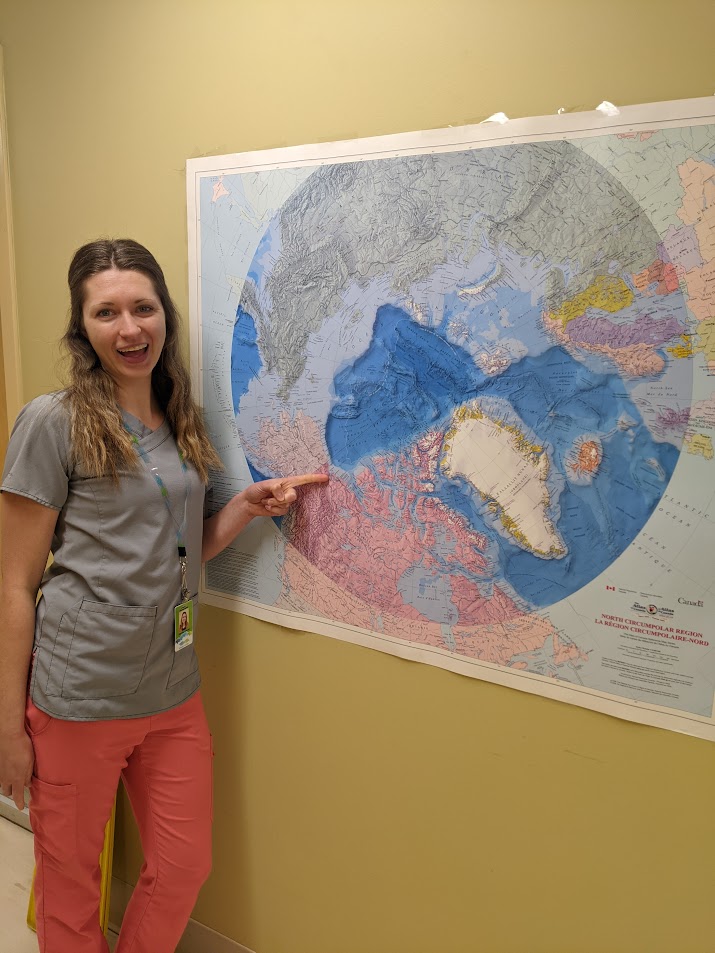Danielle (Dani) Jackson, a sonographer at Victoria Hospital, spent three weeks last year in Inuvik, N.W.T., providing medical care to patients.

Inuvik is the northernmost town in the Northwest Territories. It is home to 3,000 people and one hospital. In the colder months of the year, most of the roads are closed due to ice, which means patients need to fly to and from appointments or into town.
The hospital hosts specialists, like Jackson, on a rotational basis, since there are no in-house sonographers to do ultrasounds or medical imaging. Limited medical care and resources are an issue across Canada, but in places like Inuvik this is especially prominent.
“They rely on a system of locums,” Jackson says. “So different sonographers from across Canada, including many from B.C., other parts of the Northwest Territories and even out east, will fly in and they’ll do stints between two and six weeks where they supply their skills.”
While in Inuvik, Jackson provided ultrasounds for pregnant people, as well as those experiencing abdominal and pelvic pain, and breast cancer.
Inuvik is located about two hours south of the Arctic Ocean, and about the same distance above the Arctic Circle, which separates the Artic seas and ocean from the rest of the world. It is also where most northern lights are visible.
- RCMP arrests alleged hitmen accused of killing B.C. Sikh leader
- Fall COVID-19 vaccine guidelines are out. Here’s what NACI recommends
- Some 2019 candidates ‘appeared willing’ to engage with foreign interference: Hogue inquiry
- Thousands of Canada’s rail workers have a strike mandate. What happens now?
“I got to see the northern lights, which was incredible,” Jackson said. “But getting to meet my patients made it a really great experience for me. If it worked out where I could go again, it’s definitely something I’d be interested in.”
Inuvik is the traditional land of the Inuvialuit, Gwich’in and Métis people, but many non-Indigenous people live there as well. Hunting, trapping and fishing on the land are how most people make their living.
The region also experiences the midnight sun for the summer solstice, where there is a 24-hour period of daylight. Jackson said she had the opportunity to join in some events, including a book launch of the first Artic Indigenous commercial pilot at the Inuvik friendship centre.
“He’s been flying for 70 years. They (community members) shared their stories about how he helped them, from becoming their own medevac when the medevacs said it was too unsafe, he would land on the crazy ice in the middle of the night in a winter storm and save people,” Jackson said.
“I got to hear about a man who was six at the time when he got a gunshot wound while hunting and this was the man who ended up saving him and to see this man here, middle age, talking about how this guy literally changed his life and allowed him to have his own children, I was legitimately brought to tears.”
Marcia Trieu, director of the department of medical imaging at Victoria Hospital, said the whole process of preparing for this initiative took between six and eight months after the initial phone call.
“The whole process started through a connection of a mutual acquaintance,” Trieu said. “We set up several exploratory meetings to understand what their needs were, and once we had a better understanding that their needs were specific to an ultrasound technologist, we really did some brainstorming to see what we could do and support.”
Jackson was eager to jump on this opportunity to explore parts of Canada she had never been to and to provide care to a population that needed it and otherwise could not access it.
“It did take four flights to get up there, including staying overnight at a hotel, and then of course flights to get home,” Jackson said. “But it all worked out smoothly and they have a designated apartment there. That’s their ultrasound apartment currently.”
After experiencing the success of last year’s opportunity, Trieu is looking at providing this opportunity again in 2025 if the hospital in the Northwest Territories is interested in that partnership.
“I hope that others in the London Health Sciences Centre would be willing to take the chance and go for it themselves,” Jackson said. “You do get to really make an impact, which is awesome.”








Comments